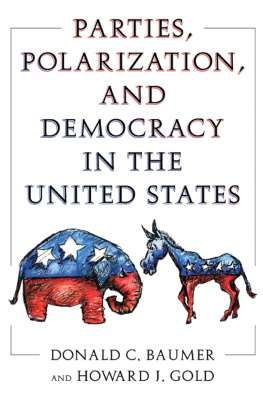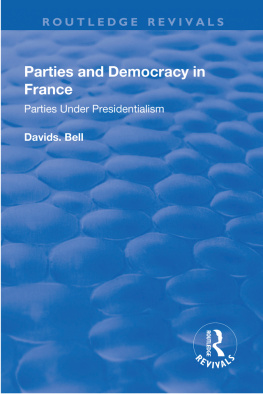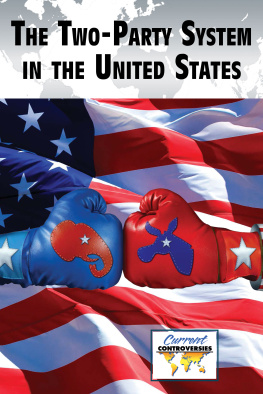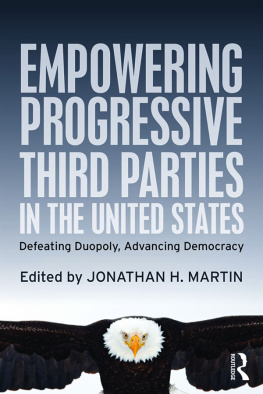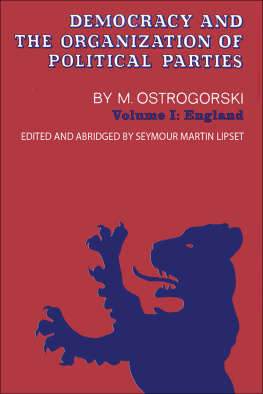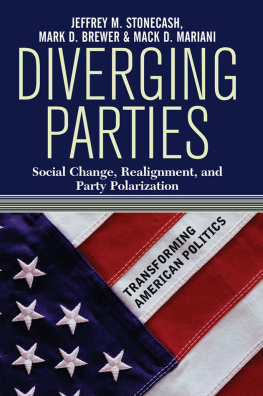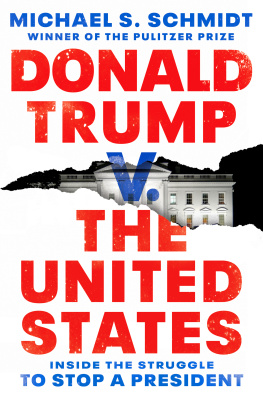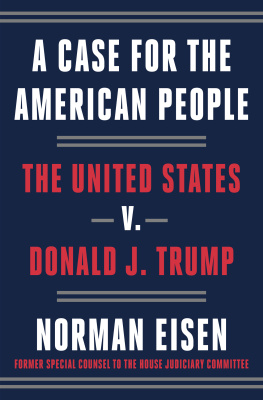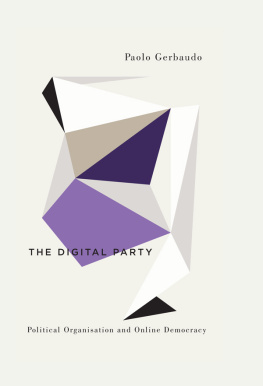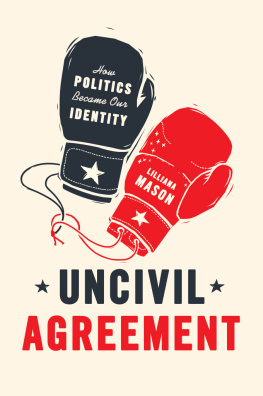Parties, Polarization, and Democracy in the United States
Parties, Polarization, and Democracy in the United States
DONALD C. BAUMER
HOWARD J. GOLD
First published 2010 by Paradigm Publishers
Published 2016 by Routledge
2 Park Square, Milton Park, Abingdon, Oxon OX14 4RN
711 Third Avenue, New York, NY 10017, USA
Routledge is an imprint of the Taylor & Francis Group, an informa business
Copyright 2010, Taylor & Francis.
All rights reserved. No part of this book may be reprinted or reproduced or utilised in any form or by any electronic, mechanical, or other means, now known or hereafter invented, including photocopying and recording, or in any information storage or retrieval system, without permission in writing from the publishers.
Notice:
Product or corporate names may be trademarks or registered trademarks, and are used only for identification and explanation without intent to infringe.
Cataloging-in-Publication Data is available from the Library of Congress.
ISBN 978-1-59451-667-2 (hardcover : alk. paper)
Designed and Typeset by Cynthia Young, Sagecraft, LLC.
ISBN 13: 978-1-59451-667-2 (hbk)
ISBN 13: 978-1-59451-668-9 (pbk)
Contents
Tables
Figures
Appendices
Tables
This project would not have been possible without the generous sabbatical support available at Smith College. Most of the work that produced this book was done during sabbaticals enjoyed by both authors in the 20062008 period. Another valuable resource that came our way due to our association with Smith College was our student research assistant, Shayla Livingston, who helped us greatly during the 20062007 academic year, extending into the summer.
After the bulk of the manuscript had been completed, we contacted Jennifer Knerr at Paradigm Publishers, who Howard had worked with on a previous book project, and we were fortunate enough to get a positive response from her about our project. She has been all we could have hoped for in an editorsupportive, efficient, and, most importantly, enthusiastic about the project. Our production editor, Lori Hobkirk, was also a pleasure to work with as the final manuscript took shape. We also wish to thank Professor Nick Horton of the Smith College Department of Mathematics and Statistics who provided us with valuable statistical advice. Finally, Kelly Slough provided some much needed technical assistance at the very end of the process. Of course, none of this would have been possible without the love and support of our familiesPolly, Ben, and Maggie, and Jennifer, Sarah, Annie, and Bobby.
P olarization, especially in the form of partisan polarization, has been the dominant theme of American politics over the last twenty years. It has been written about in numerous books and articles, and talked about extensively by politicians, media pundits, and ordinary citizens. Our most recent presidents, George W. Bush and Barack Obama, made frequent statements deploring the state of partisan relations, both as candidates and while in office. In the judgment of most scholars, Bush never fulfilled his promise to be a uniter, not a divider, and Obamas early efforts at bipartisan policymaking were not particularly successful.
Numerous political observers have linked partisan polarization to deeper cultural divisions within American society. Sociologist James Davison Hunter was the first scholar to put forth the notion that America was riven by deeply rooted political and cultural differences:
The heart of the culture war argument was that American public culture was undergoing a realignment that, in turn, was generating significant tension and conflict. These antagonisms were playing out not just on the surface of social life (that is, in its cultural politics) but at the deepest and most profound levels, and not just at the level of ideology but in its public symbols, its myths, its discourse, and through the institutional structures that generate and sustain public culture.
An especially memorable partisan expression of Hunters culture war thesis came in the form of a speech by Patrick Buchanan at the 1992 Republican convention, where he said, among other things:
The agenda Clinton and Clinton would impose on Americaabortion on demand, a litmus test for the Supreme Court, homosexual rights, discrimination against religious schools, women in combatthats change, all right. But it is not the kind of change America wants. It is not the kind of change America needs. And it is not the kind of change we can tolerate in a nation that we still call Gods country
My friends, this election is about much more than who gets what. It is about who we are. It is about what we believe. It is about what we stand for as Americans. There is a religious war going on in our country for the soul of America. It is a cultural war, as critical to the kind of nation we will one day be as was the Cold War itself. And in that struggle for the soul of America, Clinton & Clinton are on the other side, and George Bush is on our side. And so, we have to come home, and stand beside him.
To be sure, not all analysts share the Hunter/Buchanan position that America is fundamentally divided over political and cultural issues. In their acclaimed book Culture War? The Myth of a Polarized America, political scientist Morris Fiorina and his colleagues accept the notion of a major divide between partisan elites, but they do not believe that this extends to the mass public. Most Americans, they believe, are somewhere in the middle on the leading political and cultural issues, which means that their true preferences are not reflected in the choices presented to them by partisan elites. In this book we will argue that American political parties represent sharply different values, policies, and constituencies, that the American public recognizes these sharp differences, and that this partisan polarization runs deeply into the electorate. We will also argue that there are many reasons to believe that the current state of party politics is healthy for the American republic.
Political parties exist to win elections; thus fierce competition between parties should be expected. Rival parties offering contrasting positions on vital issues of public policy is an essential element of a functioning democracy. Most voters need the kind of guidance that contending parties provide in order to make sense out of the choices they are offered in elections. Although citizens are turned off by public displays of personal animosity by politicians, they also want and expect elected officials to vote their consciences and to stand up for the political principles and policy positions they espoused during election campaigns. Whether they recognize it or not, peoples attitudes and beliefs about politics and politicians contribute to political conflict. Without conflict there is no meaningful democracy.
The logic of conflict expansion and its relationship to democracy is explained cogently and persuasively by political scientist E. E. Schattschneider.limit the scope of conflict to maintain their competitive advantage. For example, white Southerners prevented black Southerners from voting for many years as part of an effort to stop them from gaining the political power necessary to change their situation of oppression. A similar analysis can be used to explain most of the great political battles in American history, which basically involve some interests (usually powerful ones) trying to privatize conflict, while others (aspiring interests) try to socialize it. For Schattschneider, conflict expansion and democracy are synonymous, and political parties are the primary engines of conflict expansion.


